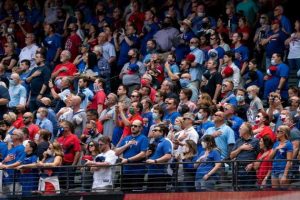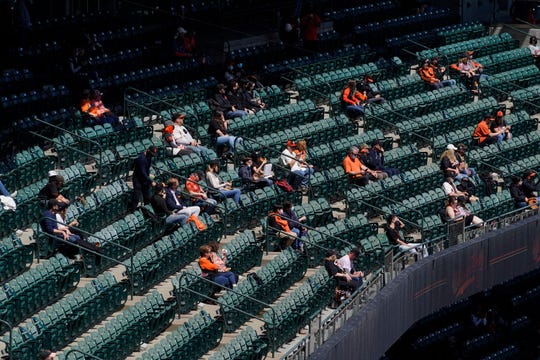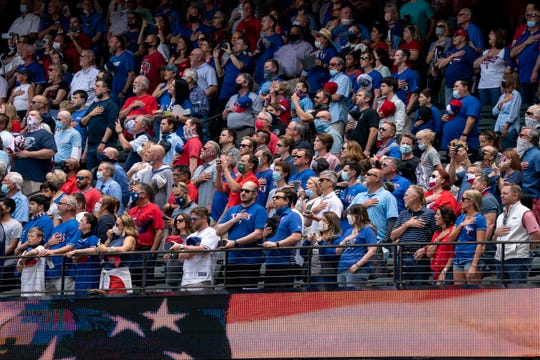In COVID’s late innings, Major League Baseball should take precautions and keep fans safe

TGBB: Thank goodness baseball’s back, and not just on the diamonds but in the stands as well. At MLB ballparks, actual people have replaced last season’s paper cutouts. Trouble is, in some stadiums this spring’s cheering fans appear to have cardboard for brains.
I’ve been studying video feeds from all MLB parks, and the difference in masking and distancing is striking. There are few fans and many masks in, say, San Francisco and New York, but packed seating and few masks in Phoenix and Arlington, Texas.
Baseball has long been the Great American Metaphor, so how it handles — or, in some cases mishandles — this stage of the COVID-19 pandemic is enlightening. The Major Leagues should be doing better, and so should a few of its owners and many of its fans.
Here’s how topsy-turvy things have been. The Giants and the New York Mets and Yankees are requiring fans to show proof of a negative coronavirus test within 72 hours of the game, or that they have been vaccinated, in order to enter the ballpark. Capacity, for now, is capped at 20%.
But at Globe Life Field in Arlington, Texas, a near-capacity crowd of 38,238 was allowed for the Rangers home opener April 5, with few masks to be seen.
Team owners should be cautious
At stadiums such as PNC Park in Pittsburgh and Oriole Park in Baltimore, television coverage shows cautious, socially distanced seating. At Chase Field in Phoenix, however, 19,385 people attended the Diamondbacks game on April 9, many without masks, creating a scene that was reminiscent of Florida beaches during the height of the pandemic.
Yet, while some teams and fans acted as if complete normality had returned, the seriousness of the situation was underscored in Washington, D.C., where the opening series between the Mets and Nationals was postponed after several players tested positive for COVID-19.
Fans might be reckless, but team owners and MLB are downright hypocritical. MLB’s written policy for allowing fans back into ballparks this season calls for social distancing and mandatory masks. The cop-out is that teams can also adhere to “local guidelines.”
Fans sit distanced at Oracle Park in San Francisco before an opening day game between the Giants and the Colorado Rockies on April 9, 2021. (Photo: Eric Risberg, AP)
In Texas, although Gov. Greg Abbott lifted the state’s mandatory mask policy, Rangers COO Neil Leibman stated: “We will require all those who enter Globe Life Field to wear a mask or face covering, and are working with Major League Baseball on some additional protocols required for player health and safety.” As the pictures show, that is simply not true — or, as we’re now free to say in journalism, a lie.
MLB has not been shy about exerting its power and influence on other matters. It unilaterally yanked the July All-Star Game from Truist Park in Atlanta because of Georgia’s imposition of controversial voting laws. Bravo. But then why turn timid when it comes to fan safety during the pandemic?
Fans stand for the national anthem before a baseball game between the Texas Rangers and the Toronto Blue Jays on April 5, 2021, in Arlington, Texas. (Photo: Jeffrey McWhorter, AP)
Economic interests shouldn’t be allowed to override health and safety issues, but often they do. Baseball is happy to make rules about masks while allowing team owners to break them. Owners, meanwhile, are willing to issue statements about mask requirements, but few will insist that stadium personnel enforce the rules.
Anyone who has attended a Major League game knows how difficult it is for well-meaning ushers to deal with drunken and rowdy fans. The backlash if mask rules were enforced — especially in places like Arizona — would be daunting. That’s why teams are wise to require vaccinations or proof of testing before fans can even enter a stadium. It’s the only way, for now, to keep the social conflicts as well as the virus out of ballparks. Legally, private businesses are free to make such rules.
Return trip to normal: Don’t call it a vaccine passport. It’s a ticket to life after COVID.
The government’s top infectious-disease expert, Dr. Anthony Fauci, says he expects seating capacity at MLB parks to be gradually expanded as the season progresses, but he says spaced seating and masking should be required. In a recent Washington Post-University of Maryland poll, 64% said they would be comfortable attending events such as baseball games if masks were required.
Asked by The Post whether he believes masks should be mandatory, Dr. Fauci replied, “Yeah.”
Baseball must do better on COVID
I’m intrigued by what the Miami Heat tried for this basketball season, using COVID-sniffing dogs to check people as they enter the arena. Why can’t baseball do that?
Baseball could try any number of incentives for masking, without tasking ushers with enforcement. How about: Anyone who’s wearing a mask when they catch a foul ball or home run gets $100.
How to champion voting rights: MLB should have moved the All-Star Game to Washington, D.C.
I applaud what teams like the Giants, Mets and Yankees are doing, with testing and vaccination requirements, plus limits on attendance. The Giants allowed only 7,390 fans to attend their home opener at Oracle Park, a 41,915-seat venue that routinely sells out on opening day in normal times.
Watching video from last weekend’s games, particularly in Phoenix and Arlington, I was disappointed in the MLB for not taking a strong stand on such things; in the teams for not enforcing their own health rules; in the broadcasters for not commenting negatively about those without masks; and in the fans themselves for harboring the misguided notion that endangering others is somehow a show of social or political independence.
The pandemic is entering the late innings. This is no time to take our eyes off the ball.
Peter Funt, a writer and host of “Candid Camera,” is working on a book called “Playing Potus,” about TV portrayals of sitting presidents.
You can read diverse opinions from our Board of Contributors and other writers on the Opinion front page, on Twitter @usatodayopinion and in our daily Opinion newsletter. To respond to a column, submit a comment to [email protected].
Source: Read Full Article


